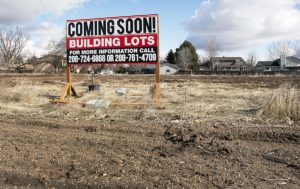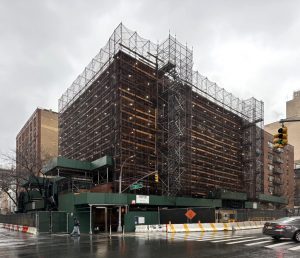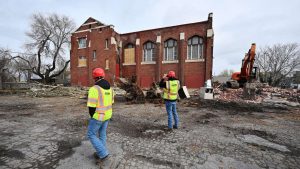Seven Detroit-based companies selected for demolition of 1,380 blighted city houses
Published by John on
Detroit — Companies headquartered in the city will take on the first wave of more than 1,300 residential demolitions under a bond plan approved by voters last fall, Mayor Mike Duggan said Friday.
The city’s new Demolition Department will be seeking approval from the City Council to hire the seven companies — five of which are Black-owned — to conduct 1,380 demolitions paid for through the $250 million blight bond initiative, Proposal N. Duggan noted that under the city’s prior, federally-funded demolition effort, local hiring preferences weren’t permitted, nor did that work touch all corners of the city. But with the city’s new program those limitations are lifted.
“I promised you that more than 51% of contracts awarded under Proposal N would go to Detroit companies,” Duggan said during a Friday news conference. “One hundred percent of the first bids are going to Detroit companies.”
The companies were selected from 180 competitive bids for $30 million in contracts for residential properties being targeted under the plan. Each of the small firms has hired a workforce that’s more than 50% Detroit residents to do the work under the contracts, Duggan said.
The city administration next week will submit to City Council 23 contracts — each with about 60 properties — for the work. If the agreements gain approval this month, abatement can start in February and Detroiters will begin seeing demolitions this spring. The first portion of the bonds will be issued in February, Duggan said, noting the city presented the plan to rating agencies in recent days. The companies include Detroit Next, Inner City Contracting, Juniors Jr, Moss Company, RDC Construction, Rickman Enterprises and SC Environmental.
The ballot initiative was approved by a majority of Detroit voters in November and aims to take down 8,000 blighted homes over five years and renovate another 8,000 that officials believe can be salvaged.
Detroit razed more than 15,000 houses with $265 million in federal money awarded to the city in multiple rounds of the Hardest Hit program. The last home demolished with federal blight money came down last summer and the city, strained amid the COVID-19 pandemic, has since been limited to emergency demolition work.
City officials have said the bond money will help Detroit launch another aggressive round of demolitions, prioritizing the areas most overrun with abandoned homes that weren’t covered under the federal program.
Of the 16 houses on the north side of Wade between Park and Dickerson, 12761 Wade, right, is one of 14 abandoned houses. 12761 Wade is on the list of the first 1,380 homes that are expected to be demolished beginning this spring. Arthur Jemison, the city’s group executive of Housing, Planning and Development, stressed to The News last month that neighborhoods where residents have been living alongside multiple vacant houses will be the top priority.
“The places where those houses are in Detroit, we’re starting there,” Jemison said in December.
Under the federal program, demolitions were limited to certain areas based on the density of occupied homes. Detroit has the ability to conduct demolitions in all city neighborhoods under the new program, officials noted.
The target sites are prioritized based on areas where there are two occupied homes on either side of a blighted property, an occupied home next to a blighted house or an occupied house that is directly between two blighted houses, the city said.
Duggan was joined Friday by the city’s Chief Procurement Officer, Boysie Jackson, to discuss the initial contracts. The next release of bid packages will be out in the next month, Jackson said.
“We’re optimistic and confident that these companies can do the job,” he said. Detroit City Councilman Scott Benson, who represents the city’s District 3, said the outcome of the initial bids is “a promise kept.”
Council members have long advocated for residents to have a larger role in the millions spent on demolition work in the city. “We talked about having Detroit-based companies, Black-owned companies, our own residents do this work,” he said. “This just shows how residency in Detroit has its privileges. That’s where we are today.”
Councilman Gabe Leland, who represents District 7 on the west side, said residents have been asking for homes in his area to be torn down for years, and that will happen with the first round of demolitions.
“This is one more step forward to getting into our communities, razing open and vacant structures that have been plaguing these neighborhoods for 10, 20 or 30 years,” he said.
Opponents of the bond have pointed to the city’s controversial history with federal demolition work.
The city fell under scrutiny in the fall of 2015 when questions were raised over bidding practices and soaring costs. Over time, the effort has been the subject of federal, state and local criminal investigations, audits and reviews.
cferretti@detroitnews.com




